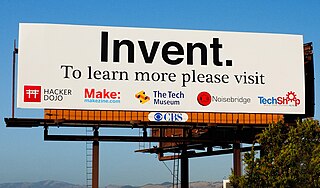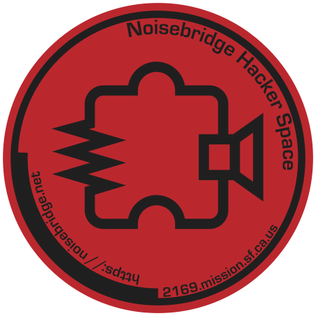Related Research Articles

Oakland is the largest city and the county seat of Alameda County, California, US. A major West Coast port city, Oakland is the largest city in the East Bay region of the San Francisco Bay Area, the third largest city overall in the San Francisco Bay Area, the eighth most populated city in California, and the 45th most populated city in the United States. With a population of 433,031 as of 2019, it serves as a trade center for the San Francisco Bay Area; its Port of Oakland is the busiest port in the San Francisco Bay, the entirety of Northern California, and the fifth busiest in the United States of America. An act to incorporate the city was passed on May 4, 1852, and incorporation was later approved on March 25, 1854, which officially made Oakland a city. Oakland is a charter city.
"Skinner's Room" is a science fiction short story by American-Canadian author William Gibson, originally composed for Visionary San Francisco, a 1990 museum exhibition exploring the future of San Francisco. It features the first appearance in Gibson's fiction of "the Bridge", which Gibson revisited as the setting of his acclaimed Bridge trilogy of novels. In the story, the Bridge is overrun by squatters, among them Skinner, who occupies a shack atop a bridgetower. An altered version of the story was published in Omni magazine and subsequently anthologized. "Skinner's Room" was nominated for the 1992 Locus Award for Best Short Story.

Kaiser Convention Center is a historic, publicly owned multi-purpose building located in Oakland, California. The facility includes a 5,492-seat arena, a large theater, and a large ballroom. The building is #27 on the list of Oakland Historic Landmarks., and was listed on the National Register of Historic Places in 2021.

Oakland School for the Arts (OSA) is a visual and performing arts charter school in Oakland, California, United States. OSA opened in 2002 with a curriculum that integrated college preparatory academics with conservatory-style arts training. As of 2017, enrollment was 725 students in grades 6 through 12. It is a member of the Arts Schools Network and the National Association for College Admission Counseling. In 2009, OSA was named a California Distinguished School.
The Avalon Ballroom was a music venue in the Polk Gulch neighborhood of San Francisco, California, at 1244 Sutter Street. The space operated from 1966 to 1969, at the height of the counterculture movement. It also had a reopening 34 years later, from 2003 to 2005.

The William Westerfeld House is a historic building located at 1198 Fulton Street in San Francisco, California, United States, across the street from the northwest corner of Alamo Square. Constructed for German-born confectioner William Westerfeld in 1889, the home is listed on the National Register of Historic Places and is San Francisco Landmark Number 135.

The Metalab is a hackerspace in Vienna's central first district. Founded in 2006, it is a meeting place of the Viennese tech community, hosting events from culture festivals to user groups. It has played a catalyst role in the global hackerspace movement and was the birthplace of several internet startup companies.

Uptown Oakland or The Uptown is a neighborhood in Downtown Oakland, California. Its boundaries are ill-defined, but most definitions include the area between 27th Street to the north, San Pablo Avenue to the west, City Center to the south, and Harrison St to the east. The neighborhood has become an important entertainment district in recent years.

A hackerspace is a community-operated, often "not for profit", workspace where people with common interests, such as computers, machining, technology, science, digital art, or electronic art, can meet, socialize, and collaborate. Hackerspaces are comparable to other community-operated spaces with similar aims and mechanisms such as Fab Lab, men's sheds, and commercial "for-profit" companies.
TOG is a hackerspace in Dublin, Ireland. tóg is a word in the Irish language; one of its meanings is 'to build or construct'.

The maker culture is a contemporary subculture representing a technology-based extension of DIY culture that intersects with hacker culture and revels in the creation of new devices as well as tinkering with existing ones. The maker culture in general supports open-source hardware. Typical interests enjoyed by the maker culture include engineering-oriented pursuits such as electronics, robotics, 3-D printing, and the use of computer numeric control tools, as well as more traditional activities such as metalworking, woodworking, and, mainly, its predecessor, traditional arts and crafts. The subculture stresses a cut-and-paste approach to standardized hobbyist technologies, and encourages cookbook re-use of designs published on websites and maker-oriented publications. There is a strong focus on using and learning practical skills and applying them to reference designs. There is also growing work on equity and the maker culture.

Noisebridge is an anarchistic hackerspace located in San Francisco, inspired by European hackerspaces Metalab and c-base in Berlin. It is a registered non-profit California corporation, with IRS 501(c)(3) charitable status. It describes itself as "a space for sharing, creation, collaboration, research, development, mentoring, and learning" and outside of its headquarters forms a wider community around the world. It was organized in 2007 and has had permanent facilities since 2008.
The digital commons are a form of commons involving the distribution and communal ownership of informational resources and technology. Resources are typically designed to be used by the community by which they are created.
The following is a timeline of the history of the city of Oakland, Alameda County, California, United States.

The history of Oakland, a city in the county of Alameda, California, can be traced back to the founding of a settlement by Horace Carpentier, Edson Adams, and Andrew Moon in the 19th century. The area now known as Oakland had seen human occupation for thousands of years, but significant growth in the settlements that are now incorporated into the city did not occur until the Industrial Revolution. Oakland was first incorporated as a town in 1852.
Ryan Bethencourt is a United States scientist, entrepreneur, and biohacker best known for his work as co-founder and CEO of Wild Earth, Partner at Babel Ventures and cofounder and former Program Director at IndieBio, a biology accelerator and early stage seed fund. Bethencourt was head of life sciences at the XPRIZE foundation, a co-founder and CEO of Berkeley Biolabs, a biotech accelerator, and Halpin Neurosciences, an ALS therapeutics-focused biotech company. Bethencourt co-founded Counter Culture Labs, a citizen science nonprofit, and Sudo Room, a hacker space based in downtown Oakland, California.

Double Union is a San Francisco hacker/maker space. Double Union was founded by women in 2013 with the explicit goal of fostering a creative safe space. The organization’s mission is to be a community workshop where women and nonbinary people can work on projects in a comfortable, welcoming environment.
Liberating Ourselves Locally is a makerspace/hackerspace in the Fruitvale district of Oakland, California. It is part of the Bay Area Consortium of Hackerspaces (BACH).
Sudo Room is a free hackerspace based in Oakland, California located in the Omni Commons

Qilombo was a community space in West Oakland, California, United States of America from 2011 through 2019. It was originally opened as an anarchist self-managed social center then changed its name and became a space for local Black and Brown people from 2014 onwards. The centre initiated the Afrika Town project and created the Afrika Town garden on an empty lot adjacent to the Qilombo building. Qilombo fought its eviction and was finally closed in 2019 by Alameda County officials.
References
- ↑ Stelzer, Andrew (2016-10-09). "5 Years After Occupy Oakland, Still Fighting for the 99 Percent". KQED News. Retrieved 2016-10-10.
- ↑ Mark, Julian. "Newly Formed Multi-Disciplinary Collective Omni Oakland Eyes Former Omni Building". East Bay Express . Retrieved 2016-10-10.
- ↑ Anderson, Eric James (2014-11-18). "Oakland's Omni Commons space is where it's at - Oakland Local". Oakland Local. Retrieved 2016-10-10.
- ↑ Bethencourt, Ryan (2015-12-10). "Oakland's Tech Boom Will Be Very Different from San Francisco's — The Bold Italic — San Francisco". The Bold Italic. Retrieved 2016-10-10.
- 1 2 "Spirit of Occupy lives on in new super-collective". The Mercury News. 2 January 2015. Retrieved 2016-10-10.
- ↑ "History - Ligure Club of Oakland". ligureclub.com. Ligure Club, Inc. Retrieved 2021-05-04.
- ↑ various authors. "Omni Commons Wiki-- Building". omnicommons.org/mediaWiki. Retrieved 24 July 2017.
- ↑ "Ballroom events listing" . Retrieved 24 July 2017.
- ↑ "About Us". omnicommons.org. Retrieved 2016-10-10.
- ↑ "Founding Document". omnicommons.org. Omni Commons. Retrieved 2016-10-10.
- ↑ Harhen, Nora (2016-04-08). "Back and Forth: Counter Culture Labs". The Daily Californian . Retrieved 2016-10-10.
- ↑ "Sudo Room". Live Work Oakland. Retrieved 10 October 2016.
- ↑ "Sudo Room Calendar of Events". Sudoroom.org. Retrieved 24 July 2017.
- ↑ Martin, Will. "Peoplesopen.net Network Map". Peoplesopen.net blog. Retrieved 24 July 2017.